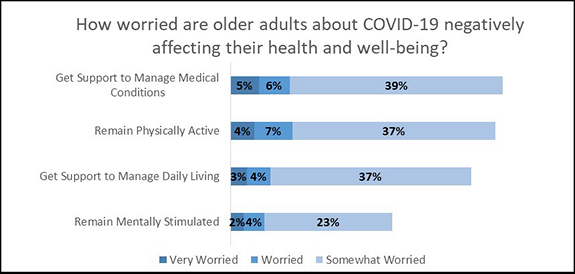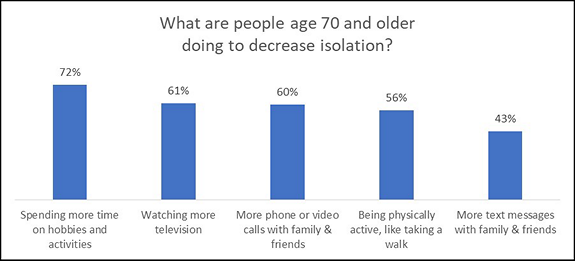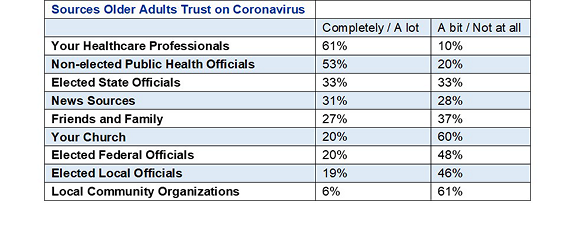More Than Half Of Older Adults In The U.S. Have Experienced Disruptions In Care Due To Coronavirus
Survey from The John A. Hartford Foundation and The SCAN Foundation shows older adults are prepared to self-isolate, but many are already experiencing loneliness.
Amidst fears about managing their chronic conditions, survey conducted by NORC at the University of Chicago shows Americans age 70 and older are utilizing telehealth.
CHICAGO, April 27, 2020 — A nationwide survey conducted by NORC at the University of Chicago shows more than half of all adults in the United States age 70 and older have experienced a disruption in their medical care during the first month of social distancing (55%) due to coronavirus (COVID-19).
Co-designed and funded by The John A. Hartford Foundation and The SCAN Foundation—both leaders in improving care for older adults—this survey shows many older adults canceled or delayed non-essential medical treatment (39%) or primary or preventive care (32%) since social distancing began. Even more alarming, more than one in six already reported delaying or canceling an essential medical treatment they need (15%).
“The first month of social distancing in America certainly saved lives, and yet it also created a situation where many older adults are not getting the care they need to manage serious health conditions,” said Bruce Chernof, MD, FACP, President and CEO of The SCAN Foundation. “As our nation grapples with when and how to reopen, the healthcare system will reckon with unaddressed medical needs and learn how to maximize new protocols to care for older adults with complex needs in flexible, person-centered ways.”
The survey shows older adults are most worried about interruptions to getting support to manage their medical conditions, compared to other concerns related to their health and well-being.

The survey reveals that clinicians proactively checked on patients in the initial weeks of confronting the virus and deployed telehealth to help treat them. Nearly one-fourth of older adults surveyed said that their healthcare providers or their staff reached out to them since the start of the COVID-19 outbreak to check on their well-being (23%), outside of a normally scheduled appointment.
More than one in five older adults said they’ve had a telehealth appointment since the start of the pandemic (21%). Of those, almost half said the experience was about the same as an in-person visit (49%), and very few said it was “much worse” (4%).
“Telehealth is a lifeline for many who need clinical care during this pandemic,” said Terry Fulmer, PhD, RN, FAAN, President of The John A. Hartford Foundation. “Healthcare organizations have stepped up quickly to help older adults get their care needs met with this important technology. Comfort levels with telehealth vary, but we are seeing rapid uptake in both urgent and primary care delivery. The survey results offer a promising glimpse into the future.”

Prepared to Hunker Down for the Long Haul
An overwhelming 83 percent of people age 70 and older said they are prepared to self-isolate for several months, if required, to stay healthy and safe and to protect others. Nevertheless, one month into social distancing, one in three older adults reported experiencing more feelings of loneliness since the pandemic became widespread in the United States (33%).
To decrease isolation, older adults said they’re spending more time on hobbies, watching TV, chatting with family, and being physically active.

Views on Trusted Sources of Coronavirus Information
Amidst many sources of information on the novel coronavirus and treatment of COVID-19, the survey shows that Americans age 70 and older view their healthcare professionals and non-elected public health officials as the most trustworthy sources of information, followed distantly by elected state officials.
Methodology
The survey was conducted by NORC at the University of Chicago using the AmeriSpeak® Panel—NORC’s probability-based panel designed to be representative of the U.S. household population. Interviews with 1,039 adults age 70 and older were completed for this survey from April 10-15, 2020. The final stage completion rate is 33.9 percent. The overall margin of sampling error is +/-4.28 percentage points at the 95 percent confidence level, including the design effect. This survey was jointly funded by The SCAN Foundation and The John A. Hartford Foundation. A comprehensive listing of study questions, tabulations of top-level results for each question,
About The John A. Hartford Foundation
The John A. Hartford Foundation, based in New York City, is a private, nonpartisan, national philanthropy dedicated to improving the care of older adults. For more than three decades, the organization has been the leader in building a field of experts in aging and testing and replicating innovative approaches to care. The Foundation has three areas of emphasis: creating age-friendly health systems, supporting family caregivers, and improving serious illness and end-of-life care. Working with its grantees, the Foundation strives to change the status quo and create a society where older adults can continue their vital contributions. For more information, visit www.johnahartford.org.
About The SCAN Foundation
The SCAN Foundation is an independent public charity dedicated to creating a society where older adults can access health and supportive services of their choosing to meet their needs. Our mission is to advance a coordinated and easily navigated system of high-quality services for older adults that preserve dignity and independence. Learn more at www.thescanfoundation.org.
About NORC at the University of Chicago
NORC at the University of Chicago conducts research and analysis that decision-makers trust. As a nonpartisan research organization and a pioneer in measuring and understanding the world, we have studied almost every aspect of the human experience and every major news event for more than eight decades. Today, we partner with government, corporate, and nonprofit clients around the world to provide the objectivity and expertise necessary to inform the critical decisions facing society.
Contact: For more information, please contact Eric Young at NORC at young-eric@norc.org or (703) 217-6814 (cell).




